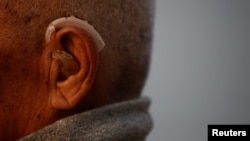On the occasion of World Hearing Day, Saturday, the World Health Organization (WHO) is warning one in 10 people globally, or more than 900 million, are at risk of disabling hearing loss by 2050 unless preventive action is taken now.
The World Health Organization reports 466 million people around the world currently suffer from disabling hearing loss. The annual cost to countries in direct health services and lost productivity resulting from this disability is estimated at $750 billion.
Problems resulting from hearing loss are expected to rise because of a growing and aging population - a population that is expected to reach 9 billion by 2050.
Shelly Chadha, a technical officer in the WHO's Department of Prevention of Deafness and Hearing Loss, says the rise in the aging population does not mean that an increase in hearing loss is inevitable. She says there are many factors besides aging that affect hearing.
“These may be factors such as infectious diseases, which we may encounter in childhood - rubella or mumps, meningitis or ear infections. There may be factors such as exposure to loud sounds, to loud music or noise at work places. Many of these causes are preventable, and by addressing them, we can reduce or minimize the risk of hearing loss,” Chadha said.
The WHO reports about 60 percent of hearing loss in children can be prevented. Measures include immunizing children against infectious diseases, screening and treating chronic ear infections, avoiding the use of drugs harmful to hearing, and controlling exposure to loud sounds and music.
In cases where hearing loss is unavoidable, the WHO says people can be helped through technologies such as hearing aids and surgically implanted electronic cochlear implants.
It says these devices are of great benefit to the hard-of-hearing because they make it possible for them to better communicate and socialize with others.




